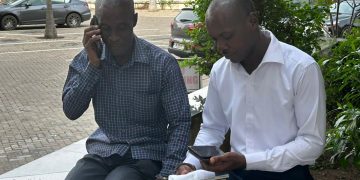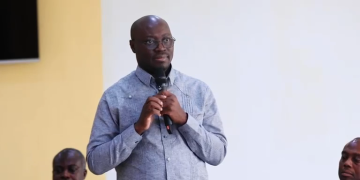- WHAT DID THE SPEAKER BAGBIN DO?
On October 17, the Speaker declared 4 seats in Parliament vacant. The declaration is based on the claim that the MPs for the 4 seats have forfeited the membership of their political parties/vehicles with which they entered Parliament.
- WHAT IS THE CONSEQUENCE OF THE DECLARATION?
3 of the 4 MPs were in the Majority caucus, while the remaining 1 was in the Minority caucus. Considering that the Majority caucus had 137 members and the Minority caucus 136, the natural consequence of the vacancies is that the then Minority caucus automatically becomes the Minority and the then Majority, Minority.
- WHAT CASE DID HON. AFENYO-MARKIN TAKE TO THE SUPREME COURT?
Hon. Afenyo-Markin’s case to the Supreme Court was the allegation that the basis of the Speaker’s declaration is unconstitutional. However, before the Supreme Court answers the constitutionality question, he asked the Court to order the Speaker to reverse his declaration – that the 4 seats are vacant.
- WHAT DID THE SUPREME COURT SAY?
The Supreme Court said that Hon. Afenyo-Markin’s allegation sounds good on the face of it, and is worth investigating. However, since the investigation would take some time, the Supreme Court will “stay” the Speaker’s ruling from coming into effect until the investigation is concluded. For emphasis, this is what the Supreme Court said:
“The execution of the ruling of the Right Honourable Speaker of Parliament Alban Sumana Kingsford Bagbin dated 17th October 2024 delivered on the floor of Parliament declaring vacant the seats of the following Members of Parliament … is hereby STAYED pending the final determination of this suit …”
- IS THERE A PROBLEM WITH THE SUPREME COURT’S “STAY” ORDER?
The beginning point is that one cannot stop what has already happened from happening. To that extent, there’s a problem. The Supreme Court’s order seeks to “stay” the Speaker’s declaration of the 4 vacancies or its natural consequence of the change in numbers and caucus positions. Interestingly, that has already happened. So, the order is, on its face, quite problematic.
- DOES THE PROBLEM MAKE THE ORDER UNENFORCEABLE?
Some lawyers interpret court orders strictly literally. Such lawyers would argue that the Supreme Court’s order is moot – it seeks to do that which is not possible, namely, “stay” that which has already happened from happening. However, to give a proper interpretation to the order, I believe that one must read the order together with Afenyo-Markin’s complaint to the Court. In doing so, one may read the order to mean that Parliament should REVERSE (rather than “stay”) the situation; that is – allow the 4 MPs to resume their work fully pending the outcome of the Supreme Court’s investigation of Afenyo-Markin’s allegation. I prefer this second meaning of the order.
- IS THE ORDER SELF-EXECUTORY?
Let’s do a little explanation here: A court order may be self-executory or non-self-executory. It is self-executory if it comes into effect without further action by anyone. Non-self-executory orders require someone to take an action to have the order come into effect. Often, self-executory orders apply to things that are yet to happen – they are capable of being stopped. They require ordinary injunction. Non-self-executory order, on the other hand, apply to things that have already happened – they cannot be stopped. They can only be reversed. They require a mandatory injunction. I think that the Court’s order is not self-executory – it requires a reversal (rather than a stoppage).
- HOW MAY PARLIAMENT COMPLY WITH THE SUPREME COURT’S ORDER?
As explained, the Speaker’s declaration was already made – the then Majority has now become the Minority and the other way around. So, Supreme Court’s order could only be complied with by way of a reversal (rather than by a “stay”). In this sense, the order requires some action by Parliament – a reversal.
- HOW DOES PARLIAMENT ACT?
Parliament acts by taking a decision. To take a decision, however, Parliament must be properly constituted. This is where quorum comes in.
- DID PARLIAMENT ACT TODAY?
No. Parliament did not act today. Even though Parliament formed a quorum to start a sitting, it did not have enough numbers to form a quorum to take a decision. This means that Parliament was incapable of taking a decision to comply with the Supreme Court’s order.
- WHY COULDN’T PARLIAMENT ACT TODAY?
Parliament couldn’t act today because the Minority (the then Majority) caucus led by Hon. Afenyo-Markin refused to enter the Chamber.
- WHY DID THE MINORITY REFUSE TO ENTER THE CHAMBER?
The Minority caucus refused to enter the Chamber of Parliament because they wouldn’t sit in some particular chairs🪑 🪑 🪑.
- WAS THE SPEAKER’S DECISION TO ADJOURN INDEFINITELY JUSTIFIABLE?
A court order no matter how bad should, unless or until set aside, be complied with. That’s the law, I think. To comply with the Court’s order, however, Parliament must, first, be properly constituted. Since Parliament was not properly constituted for a decision, and since it could not, I believe, refuse to comply with the Court order, the Speaker has no option than to adjourn sitting until such a time that the Minority is ready to enter the Chamber to help form a quorum to take a decision and reverse the situation.
Da yie.
Source: Dr Justice Srem Sai


































































